[responsivevoice_button voice=”UK English Male” buttontext=”Listen to Post”]
We have heard it a thousand times, “I don’t use chlorine; I have a saltwater pool.” The truth about saltwater pools is that homeowners do not always understand that they are using chlorine and that the only difference between this and a tablet is the chlorine delivery system. So why do they insist that it is not a chlorine pool? Here is The Truth About Saltwater Pools
Sodium chloride (NaCl).
It is merely a combination or compound of elements taken directly from the periodic table. The Cl in NaCl is Chloride. It is in a group on the periodic table known as halogens and has an atomic number of 17.
For routine maintenance How To: Cleaning a Swimming Pool Salt Cell ?
Producing Chlorine
The truth about saltwater pools is that the salt cell separates bonded elements (compounds) and in such allows for complexation. It does this through a process called electrolysis.
When we add salt is to water, we form an aqueous NaCl solution; the compound then disassociates into Na and Cl–. Therefore, it is not producing chlorine. Instead, it is “charging” the element so that it can be chlorine. Once separated and in the salt cell, 2Cl– (Chloride) becomes Cl2 (Chlorine gas) + 2e– at the anode.
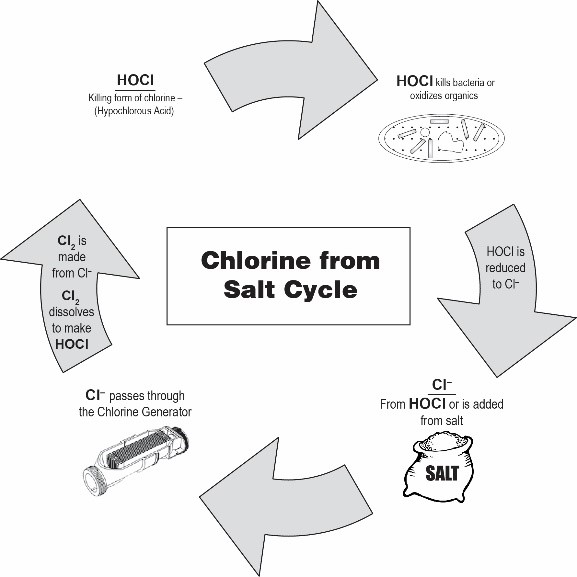
Electrolysis of Water
But wait, that’s not all. Do not forget that water (H2O) is also subject to electrolysis. Hydroxide is single hydrogen, and a single oxygen atom with a molecular bond formed in the electrolyzed water after the two hydrogen (H2) atoms separate from the Oxygen (O) atom. Some Hydrogen does become Hydrogen gas in the process. The Oxygen, as you can see from all of the “O” s above and below (i.e., HClO, ClO–, H2O, OH–), does not leave the water.
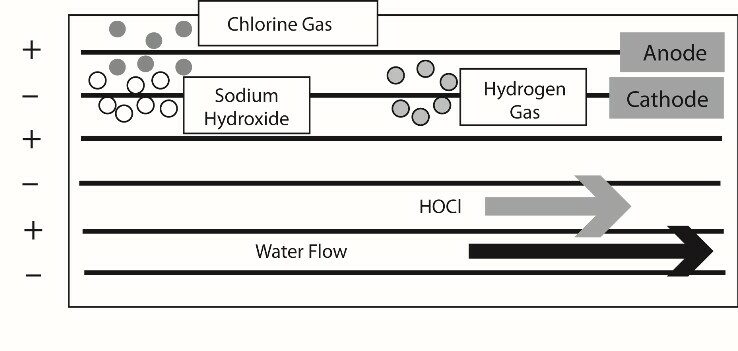
One in a Million
To simplify, we add 3,000 to 4,000 ppm of salt to a swimming pool (about 250 to 333 lbs per 10,000 gallons). Yes, this does also increase the Total Dissolved Solids level (1 pound of salt will increase the TDS of 10,000 gallons of water by 12 ppm). The saltwater solution we created passes through the electrolytic cell that contains electrically charged plates (a cathode and an anode). The sodium chloride separates into both Na (sodium) and Cl– (Chloride) in water. The Chloride becomes Chlorine Gas, then hypochlorous acid (HClO) and hypochlorite ion (ClO–). The combination of the two is known as FAC (Free Available Chlorine). The H2O separates and becomes hydrogen gas. Hydrogen’ bubbles off’ at the cathode and Oxygen collects at the Anode. This ‘bubbling’ due to electrolysis within the cell creates turbulence, which causes an increase in pH. This, and a complexation of NAOH.

The pH of salt
Wait a minute; I thought the pH was always high in a saltwater pool because the pH of salt is high? Not quite, NaCl has a pH of 7.0. The only way sodium chloride (table salt) will change the pH of water is if the starting pH is very low or very high, drawing the pH toward neutral upon addition. Do not forget, with a pH of 7.0, the closer to 7.0 the pH gets, the more salt it will take to change. Still skeptical? Try this: Take a sample of water with a pH of 7.0, add a teaspoon of salt and wait until dissolved. Do not shake the sample as turbulence can cause the pH of your sample to increase (that is an entirely different conversation). Retest your pH. Your pH will not have changed.
A Rising pH
In theory, SWGs will not change the pH of the water. In view, this is true. You start with a neutral salt and split it into Na and Cl- and put it all back into the water. In practice, the hydrogen produced is a gas, and because it is gas, it leaves the water. The hydrogen would usually neutralize the OH generated, but the hydrogen leaves creating turbulence in the water. A minute amount of sodium hydroxide is also produced.
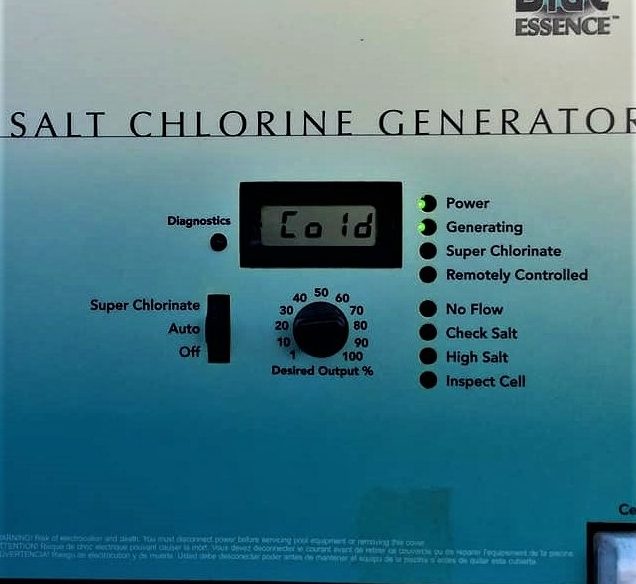
Busting the Saltwater Pool Myth
When these chlorine generators first came about, the industry was extremely hungry for a magic pill, and so were the pool owners. A one-stop end-all used to treat all pool-related problems in one shot. Unfortunately, there were, among the many honest professionals, a few bad apples. In a snake oil salesperson kind of way, the capabilities of these systems were greatly exaggerated. “Get away from the harmful effects of chlorine,” “Never add chlorine again,” were just a couple of the phrases used to close the deal.
“You don’t want your kids to suffer from chlorine allergies, do you?” kicking it into a used car lot, borderline life insurance sales type pitch. “You’ll never have to adjust the pH, buy chlorine tablets, brush the walls, skim the surface, vacuum the pool, mow your lawn, empty the dishwasher, or make your bed – the saltwater system for your pool will do it all!” Okay, I strayed, but you get the point. Sadly, the Pool Operator is usually the one who has to explain how these things work to the often-doubting Facility manager or homeowner. Not only are they using chlorine in their pool, but technically they are a chlorine manufacturer. That’s the truth about saltwater pools.
A shout out to my references:
Aquarius Education and Public Outreach
National Center for Biotechnology Information
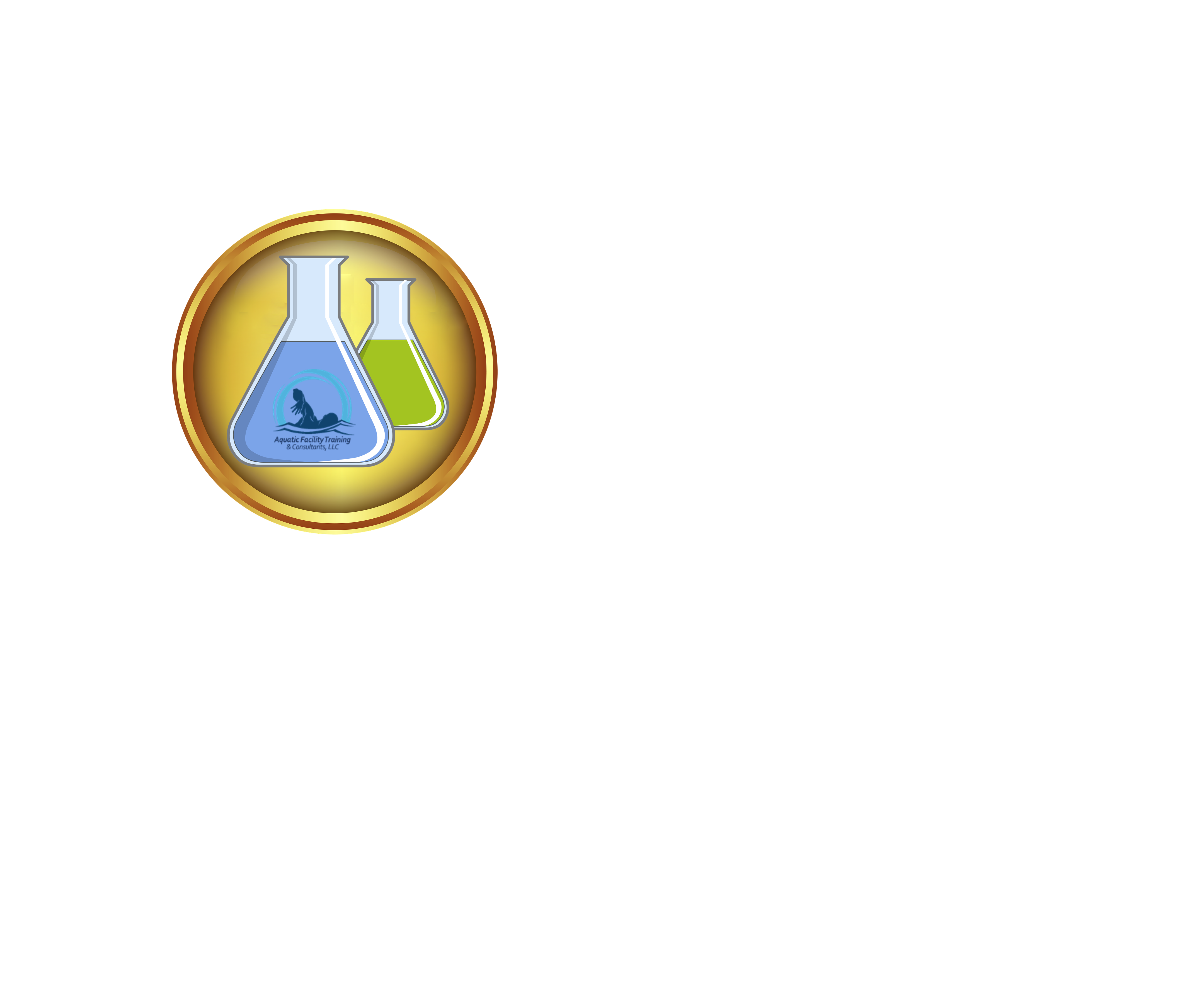
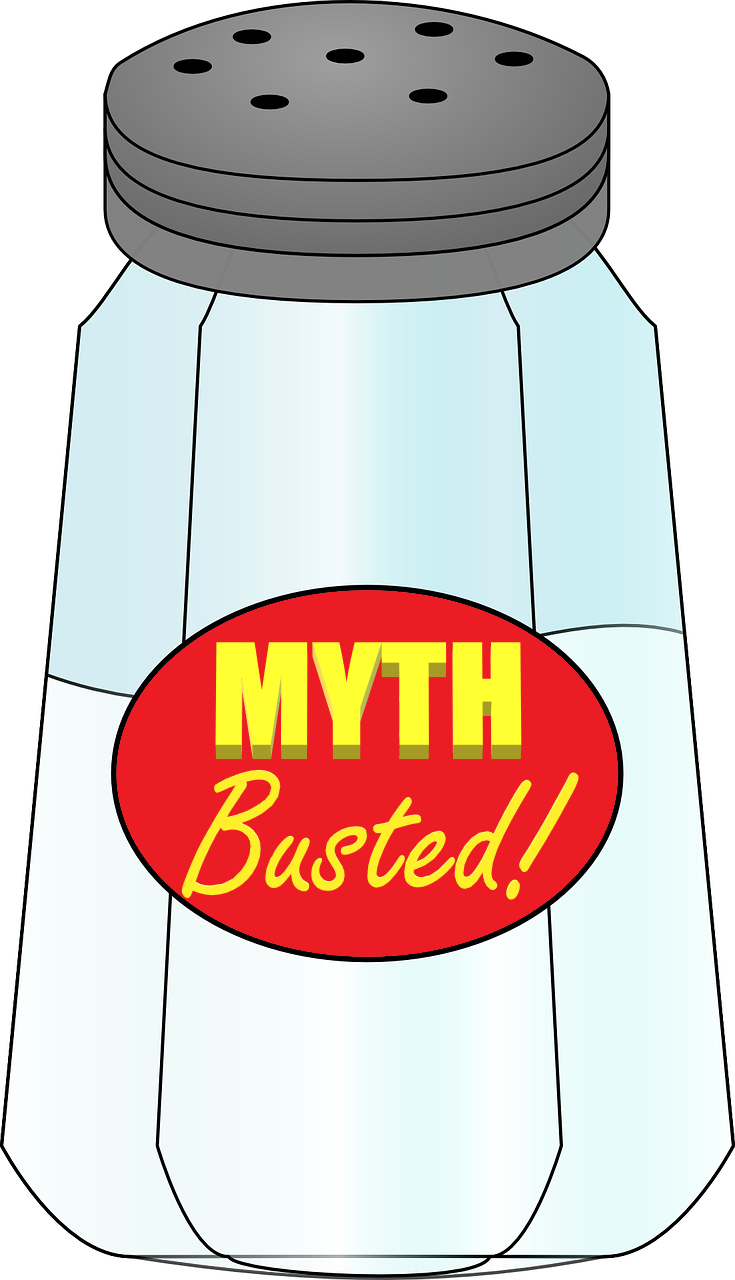

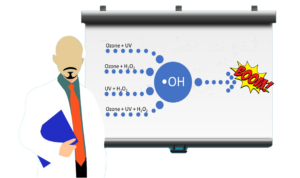
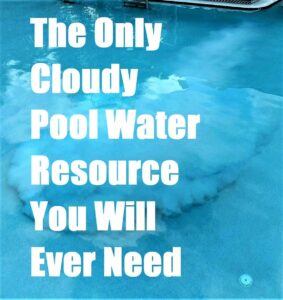
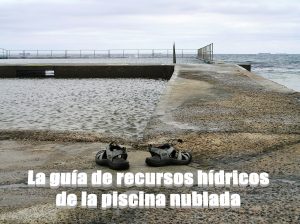

Pingback: ? Pool Owners Say the Darndest Things – Pool Operator Talk
New customer wanted a “salt” pool so she dumped 8 bags of salt in. No salt cell or system – just salt. 😛
Oh that poor thing. I hope she took the news well.
This is a great read. I have children and pools are a favorite during summer. I don’t like it if a pool is heavily chlorinated as it hurts the eyes.
Great read sir. Well worth my time. Great contribution for us/those who appreciate information that they can confidently relay. This connected some dots I needed on terminology. Thank you again.
Thank you Jason!
I used to swim in high school and I hated swimming in heavily chlorinated pools. The salt water pools I swam in were easier on the eyes.
Thank you for sharing this. I had no knowledge of saltwater pools. Your posts are always interesting and informative!
First time to hear about this. Thanks for sharing.
Salt water pools are so much better than Chlorine ones. It’s really an informative post.
Always liked saltwater pools more! The chlorine kills my eyes and skin. Thanks for sharing!
Great read! Pointing out the Cl was already present not produced was a great bonus!
Thanks, Eric and thank you for reading. Saltwater pools are so misunderstood.
enjoyed my read & learnt a lot from this sharing. Thanks for sharing this! cheers, siennylovesdrawing
Great informative read! My husband and I have discussed several time getting a pool. I appreciate your detailed and point blank explanation.
Great information! I personally don’t like chlorinated swim water. It ruins my skin and hair. Saltwater pool is better than chlorinated water pool.
The saltwater pool is better… for parents, it is more reliable a saltwater pool… Thank you for the info.
I have hear of these but never been in one or knew much about it! Thanks for sharing this!
Thank you for sharing this information. And yes I prefer saltwater pool 😀
Love reading your posts more so the comments underneath.. Is really a good freshener after a hard day.. 🙂
Very informative. Thanks for sharing!
Many years ago, the apartment complex that we lived in had a salt water pool
“I hate to poop in your cornflakes…” Hahaha.. I got a great chuckle out of that! This is also a great resource to use for the summer months. Great information!
*Samantha
This is a completely new topic for me. Thanks for sharing this info.
The saltwater pool is better… for parents, it is more reliable a chlorine pool… Thank you for the info..
I recently got a saltwater chlorinating device and after two days of having the kids swim in it they got rashes. When using the test strips to see what happened it says alkaline is about 120 to 180. But everything else is at ok levels. Does high alkaline cause rash or could it be something else? And how to reduce alkaline? I read muriatic acid but never done this before so not sure. Chlorine level is about .5-1
Ph is about 6.8
Calcium is about 0-100
Actually, the Total Alkalinity reading is the only level you posted that is within its acceptable range. I would suggest bringing a water sample to your local swimming pool store or pool service company as a first step.